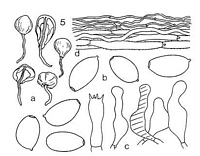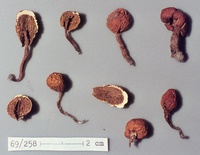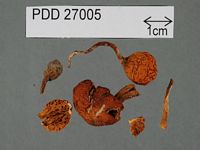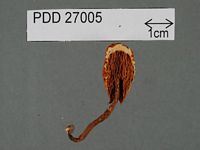|
 Nivatogastrium baylisianum Nivatogastrium baylisianum
BiostatusPresent in region - Indigenous. Endemic
Images (click to enlarge)
Caption: Nivatogastrium baylisianum Hk. : a. carpophores (nat. size) b spores (2000 x). c. chrysocystidia
(1000 x). d. cuticle (500 x). | 
Caption: ZT69-258 , Holotype
Owner: E. Horak: © Creative Commons Attribution-Noncommercial 3.0 New Zealand | 
Caption: Dried type specimen
Owner: Herb PDD | 
Caption: Dried type specimen
Owner: Herb PDD | |
Article: Horak, E. (1971). Contributions to the knowledge of the Agaricales s.l. (Fungi) of New Zealand. New Zealand Journal of Botany 9(3): 463-493 (http://www.rsnz.org/publish/abstracts.php).
Description: Pileus 6-14 mm diam., hemispherical or pear-shaped,
clavate, margin of pileus always collar-like constricting the stipe and covered
with white fibrillose remnants of the veil; orange or red-brown, paler towards
the non striate margin; smooth, slightly viscid, not hygrophanous. Lamellae
adnate or adnexed, irregularly anastomosed, lacunose, never exposed; more or
less radially arranged; dirty brown, gill edge concolourous. Stipe 10-35 x 1-2
mm, cylindrical or attenuated towards the base, no distinct columella developed;
orange or red-brown, covered by silky fibrils of the veil; dry, fistulose with
age, no rhizoids at the base. Context whitish, cortex about 2 mm thick, not
gelatinised. No smell or taste.
Spores 10-12 x 7-9 µm, oval, in KOH yellowish-brownish,
smooth, membrane up to 1 µm thick, with distinct germ pore, bilaterally symmetrical.
Basidia 28-34 x 7-10 µm, 4-spored. Chrysocystidia 25-40 x 10-13 µm, fusoid or
lageniform, thin-walled, with yellow plasmatic pigment, rare. Cuticle a cutis
consisting of repent, cylindrical hyphae (3-6 µm diam.), membrane gelatinised
and encrusted by yellow-brown pigment, sometimes plasmatic pigment of same colour
present, clamp connections numerous.
Habitat: On soil among mosses and grasses. New Zealand.
Notes: This species is named in honour of Professor
G. T. S. Baylis (Dunedin) who collected this fungus several times in the mountains
of Central Otago and whose zeal and support has stimulated mycology in New Zealand
|